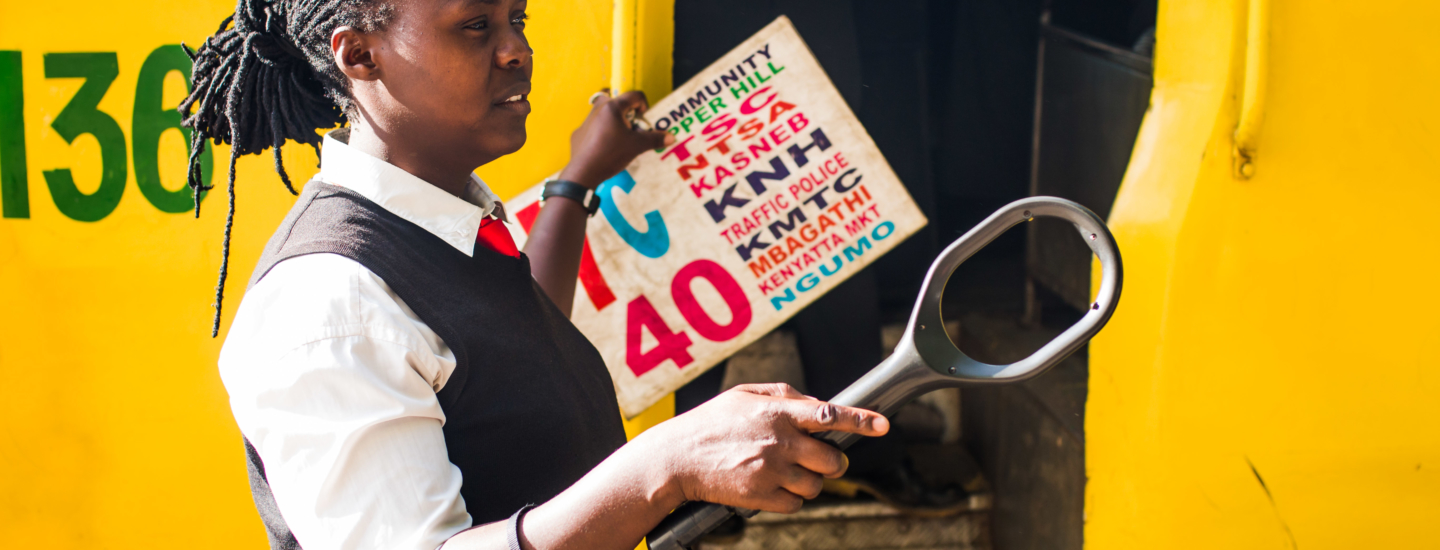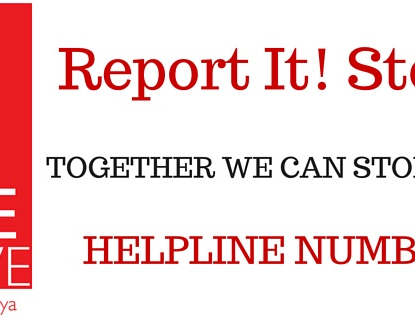Project
Women in Transport (WIT) Kenya
-
Amount Funded
24,827 EUROProject Duration
01 Jul 2018 - 30 Jun 2019 -
-
Lead organisation
-
Flone Initiative is a Kenyan women-led organisation registered as a Charitable Trust working to end violence against women and girls in public spaces with a focus on the transport industry.The transport sector still remains a male -dominated field. Gender is not just about differences between men and women; it is about how these differences get translated into practice and power sharing. It is therefore important to reiterate the importance of inclusive and safe urban mobility as a tool of women empowerment.
-
Organisation
Flone Initiative is a Kenyan women-led organisation registered as a Charitable Trust working to end violence against women and girls in public spaces with a focus on the transport industry.The transport sector still remains a male -dominated field. Gender is not just about differences between men and women; it is about how these differences get translated into practice and power sharing. It is therefore important to reiterate the importance of inclusive and safe urban mobility as a tool of women empowerment. -
Project
Flone Initiative is implementing the Women in Transport (WIT) project, seeking to identify and address the barriers for entry into public transport that women face in Kenya. Jobs in the transport sector are highly gendered and unequal. As a result, women’s voices are all too often neglected when it comes to transport planning and the pursuit of decent work in this sector. Transport is still regarded as ‘no place for women’ in many countries/sectors around the world including Kenya. In Kenya and Uganda, women in the transport sector often find themselves stuck in lower paid/lower status jobs with few, if any, opportunities for career development.This project seeks to change this narrative through the following key objectives;- To sensitise and develop working collaboration among key stakeholders in the transport sector
- To strengthen capacity of 30 key stakeholders in the transport sector to effectively mainstream gender in their policies and operations
- To strengthen the capacity of 60 women public transport operators in Nairobi and its environs to boost their professional skills for career advancement
- To organise a WIT Summit to explore technical, policy, financial, and political aspects of emerging transportation issues
-
-
Flone Initiative is implementing the Women in Transport (WIT) project, seeking to identify and address the barriers for entry into public transport that women face in Kenya. Jobs in the transport sector are highly gendered and unequal. As a result, women’s voices are all too often neglected when it comes to transport planning and the pursuit of decent work in this sector. Transport is still regarded as ‘no place for women’ in many countries/sectors around the world including Kenya. In Kenya and Uganda, women in the transport sector often find themselves stuck in lower paid/lower status jobs with few, if any, opportunities for career development.This project seeks to change this narrative through the following key objectives;
- To sensitise and develop working collaboration among key stakeholders in the transport sector
- To strengthen capacity of 30 key stakeholders in the transport sector to effectively mainstream gender in their policies and operations
- To strengthen the capacity of 60 women public transport operators in Nairobi and its environs to boost their professional skills for career advancement
- To organise a WIT Summit to explore technical, policy, financial, and political aspects of emerging transportation issues
-
“I have enjoyed being at the workshop and I am hopeful that united we will do great things and be able to support each other through the challenges of matatu (public van) life. I am honored to be the chair of the women in transport in Nairobi and we will do great things with God’s help” Elizabeth Njoki, Chairperson of Women In Transport (WIT) Nairobi Chapter
Elizabeth’s story is part of the WIT programme by Flone Initiative that has equipped women with critical skills to help them thrive in the transportation industry, as well as built their capacity around their ability to self-organise and advocate for their rights. Flone Initiative has now launched the Women in Transport project in Nairobi which seeks to create an independent Women In Transport Chapter, which will be organised and governed by women working in the transport industry.
This group was launched with a small group of Women In Transport volunteers organising workshops on parenting, financial management and on women of relevance meeting. Additionally, the women were able to come up with a name for their chapter, a constitution, held elections and are currently in the process of registering the chapter.
For Flone, ensuring that the rights of the women who work in transport are met is not the only thing they focus on but rather they also equip these women with several skills that are useful in their day to day lives and in some instances to their passengers. “The parenting meeting allowed us to share tips on raising our children. I was able to give and receive advice, which was great. The first aid training in particular has granted me skills on how to handle sick or disabled passengers. I have had to take charge in ensuring a partially blind passenger arrived at his destination safely, and got off at the right stage. On one occasion, I noticed a woman whose baby was having trouble breathing. I thought they may be suffocating and opened the windows to provide ventilation, after which the baby was more comfortable. The WIT trainings have helped me better understand the needs of my passengers.” Hellen Khakasa, Matatu Conductor.
Flone’s vision beyond Voice is to develop independently organised and autonomous WIT Chapters which are supported by and connected to Flone Initiative. This way, groups can advocate for their specific needs within various contexts and govern themselves according to their own internal agreements. We envision that the annual Women & Transport Africa Conferences can serve as a convening place for these chapters to come together, share victories and skills and develop common strategies.
“I’m glad that I have attended the WIT meetings because now my family and my co-workers are taking me more seriously. When I share what I’ve learned during these meetings on Facebook, my family and friends are able to see that working in transport is not a job to be ashamed of and is important work. At work, my superiors are able to recognize that I have more to bring to the table than the usual academic papers. I know how to market myself using the skills that I’ve gained, especially first aid, and this has helped me get other jobs in transport that are even outside of the matatu sector. Employers are able to see that I have a passion for transport, and that I have a lot of exposure, and so they have trusted me to do the job that I would otherwise have not qualified for.” Naomi Ngugi, Matatu Conductor
Flone Initiative also intends to continue implementing the Gender Sensitive Mini-Bus Services and Transport Infrastructure Toolkit over the course of the next several years. Implementation will include continued data-collection, integrating feedback and editing of the toolkit, trainings, assistance with policy development and working with government and private entity stakeholders to come up with innovative solutions to realize the toolkit recommendations. Project implementation is scheduled to take place in Mombasa, Kenya, Dar es Salaam, Tanzania, and Kampala, Uganda.
-
News





